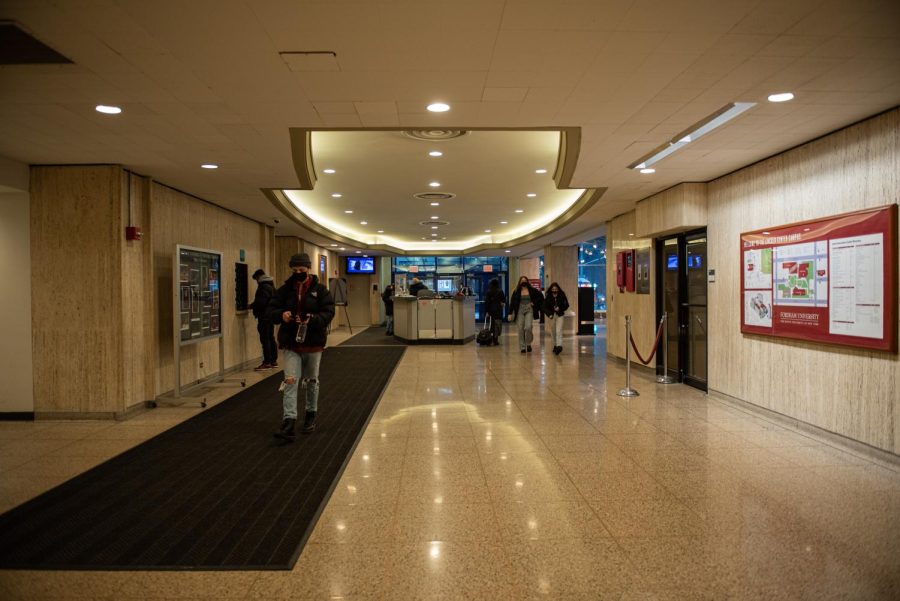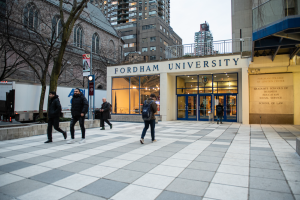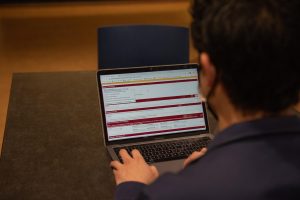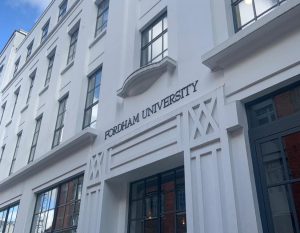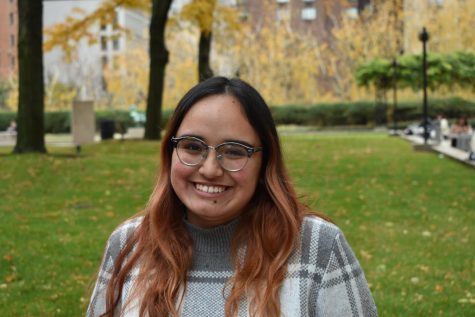Guest and Visitor Policies Change, Campuses Open to Public
Discontinued VitalCheck daily screenings and return-to-campus testing are among the new adopted protocols
Surveillance and return-to-campus testing are no longer required to be admitted on campus.
August 27, 2022
With the start of the fall semester approaching, Marco Valera, vice president for administration and COVID-19 coordinator, announced in an email sent on July 27 the updated COVID-19 policies for the university. These protocols include changes to the use of the VitalCheck daily screenings, as well as to the visitor and guest policies.
For the first time since the university closed in March 2020 due to the COVID-19 outbreak, Fordham campuses will be open to non-Fordham visitors and guests, as well as to university-sponsored external events, beginning on Sept. 1. Visitors must have completed their vaccination series and will be required to provide proof of vaccination to gain entry to campus. Valera added that details regarding visitation policies to the residence halls and overnight guest policies will be provided soon by the Offices of Residential Life at Rose Hill and Lincoln Center.
Megan Richardson, Fordham College at Lincoln Center (FCLC) ’25 and a resident in McMahon Hall, said that she is excited to have guests on campus and believes opening campus to the public could be done safely and be a positive change to the university’s community and environment. She added that although guests must be vaccinated and boosted, she feels a little nervous about the little-to-no COVID measures in place for everyone’s return to campus considering the rise in cases in some areas.
“If anything, I feel that the university should have waited until after the return to campus rush settled down, in order to monitor if cases become more prevalent on campus.”
Richardson believes that it will be a matter of time before the Fordham community sees how these new adopted protocols affect the health of Fordham students.
Michael Kroll, FCLC ’25, is excited about the campus opening to the public again, sayings that it will be nice to share the public space with the university community who gives so much back to Fordham.
“Fordham has so much to offer on the Upper West Side throughout the year in terms of art and theater and green space,” he said.
All students, faculty and staff are also required to be up to date on their vaccinations, which currently includes having received all doses in the primary series and all recommended booster doses, according to the Centers for Disease Control and Prevention (CDC). The university will continue to consider requests for individuals who have medical or religious accommodations.
“The University will continue to use VitalCheck to manage vaccine, testing, and isolation requirements, and for integration with the ID card system for access to campus.” Marco Valera, vice president for administration and COVID-19 coordinator
Free COVID-19 vaccinations became available on campus starting Monday, Aug. 1.
Another change from the spring 2022 semester is that surveillance and return-to-campus testing will no longer be required for the fall semester, but Valera noted that all individuals returning to campus are encouraged to take a PCR or rapid antigen test prior to their arrival. Testing before arrival was especially recommended for individuals traveling from outside of the New York metropolitan area.
Kroll believes that eliminating mandatory surveillance testing after a lot of students have traveled to campus is risky as Fordham navigates the transition to a COVID-endemic world.
“Testing is easy, it’s a very non-invasive way for our community to function with limited restrictions in our day-to-day lives but also maintaining a sense of security for those who are most vulnerable,” he said.
The university will provide on-demand testing and testing for suspected exposure but will limit diagnostic testing to students only. Employees who have COVID-19 symptoms are advised to not come to campus and should instead see their health care providers for diagnostic testing.
Weekly testing is no longer required for individuals who have medical or religious accommodations for their vaccination status or individuals who are not fully up to date on their vaccinations.
Since the fall 2020 semester, Fordham has partnered with the company VitalCheck to monitor the campus population’s COVID-19 symptoms. Beginning on Aug. 8, daily VitalCheck screenings will no longer be required to access campus. The VitalCheck notification will still be sent daily so individuals can report any COVID-19 symptoms and access telehealth appointments.
“The University will continue to use VitalCheck to manage vaccine, testing, and isolation requirements, and for integration with the ID card system for access to campus,” Valera said.
The university’s policies and protocols are subject to change depending on campus conditions and federal, state or local regulations, according to Valera.
Wearing masks continues to be recommended but not required in classrooms, labs, work settings and public spaces for individuals who are up to date on their vaccinations in compliance with CDC guidelines. Unvaccinated individuals are no longer required to wear masks.
“All individuals may wear masks in any setting if they choose to do so,” Valera noted. “Faculty may require masks in classrooms and laboratory settings, if they believe the particular circumstances warrant such measures.”
A mask mandate remains on Ram Vans and in University Health Services’ locations on campus, which include offices and testing and vaccination sites. The isolation and quarantine process remains the same since it was last updated on Jan. 18. Resident students who are unable to travel home to isolate will be placed in designated residence hall rooms, and commuter students will be required to isolate in their off-campus residences. Valera noted that Fordham’s contact tracing process is currently being reevaluated and details regarding its protocols will be released when available.
Quarantining upon exposure continues not to be required for students, faculty and staff who are up to date on their vaccinations, but the university encourages them to monitor their symptoms and to take a COVID-19 test five days after exposure. Human Resources will provide employees with guidance should any employees become ill on campus.
The university’s policies and protocols are subject to change depending on campus conditions and federal, state or local regulations, according to Valera.

